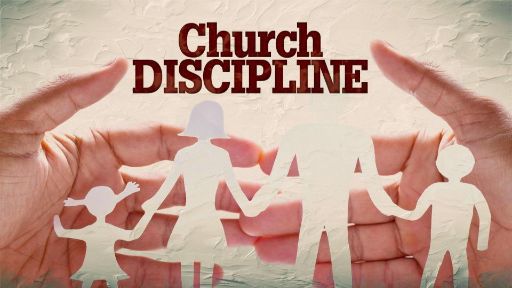-
"Discipline" Pt 1 Series
Contributed by Clark Tanner on Nov 28, 2017 (message contributor)
Summary: To know how to exercise discipline in the church, we have to begin by finding out what Jesus had to say and line up the epistles with that.
15 “If your brother sins, go and show him his fault in private; if he listens to you, you have won your brother. 16 “But if he does not listen to you, take one or two more with you, so that BY THE MOUTH OF TWO OR THREE WITNESSES EVERY FACT MAY BE CONFIRMED. 17 “If he refuses to listen to them, tell it to the church; and if he refuses to listen even to the church, let him be to you as a Gentile and a tax collector.
The passage we are using for study today may not seem to fit the theme of church discipline. It is really a discourse by our Lord on Christian conduct toward one another and forgiveness and reconciliation.
I’ve chosen to begin here however because I want to avoid a common and very destructive error. That being, the tendency to go to the epistles of Paul, pick out several related verses from I Corinthians, and 1 & 2 Timothy and Titus and a few others, and build an argument for discipline in the church and then finish by saying ‘this is what is pleasing to the Lord’… instead of going first to see what Jesus says and then make everything else line up under that.
This error of epistle-blending can lead quickly to epistle-bending and before you know it you have a convinced pastor spiritually spanking everyone in his congregation who breathes the wrong way, and eventually you have a very lonely preacher standing behind a pulpit staring at dust.
Now we who are in the local body of Cornerstone Christian Chapel are in the process of developing our By-Laws and Constitution. In this process which we take very seriously we have come to this issue and we want it to be addressed very clearly and carefully so as not to create a statement that can at some later date be used as a club or a legalistic lever against any present or future member of this body, by either the present or future leadership.
It is for this reason and no other consideration or set of circumstances around us that I felt it necessary to address the issue of church discipline from the pulpit, so that we might come at this task of completing our By-Laws with clear heads and hearts properly lined up with God’s Word and His constant leading.
PRIORITIES
As we come to look at our text verses, let us note that this entire discourse of Jesus’ from verse 3 to the end of chapter 18 is in response to a question from His disciples in reference to who would be greater in the Kingdom of Heaven.
As usual, their priorities were backward. Let’s not criticize them; if we chuckle, let’s include ourselves in their folly.
Looking back very briefly at chapter 17 we see that Jesus has told them openly in verses 22 and 23 that He is going to be delivered up and killed and that He would be raised on the third day.
We know they understood on some level because the text says they were grieved deeply. Maybe they missed the ‘raised up’ part, maybe not. There should still be grief that the death has to occur, right?
If the person we love the most has a cancer and they must go through intense chemotherapy and other painful procedures to get rid of it, and the doctor assures us that after the process they are going to be fine, we’d still be grieved for our loved one that they have to endure the pain and hardship, wouldn’t we?
In any case, with this information swimming in their heads they go to Capernaum where Peter is confronted by tax-collectors about Jesus paying taxes, so when Peter comes in the house Jesus teaches him a brief lesson about choosing his battles.
Yes, we’re sons of the Kingdom. We’re princes and princesses of the King of Kings, who owns all there is. And in even earthly kingdoms children of the king don’t have to pay taxes. That’s for the commoners to do.
But so as not to cause offense, we’ll pay taxes.
Ok, now, that’s all another sermon. But I want you to think about what might be going on in the minds of the disciples. Jesus has said He’s going to be put to death and then raised up.
On whatever level they understand this, at the very minimum they are thinking, ‘alrighty then; that which we have waited for is about to happen’.
If Jesus is going to die and come back to life, it must be time for Him to do some triumphing and taking control type stuff.
Next, He talks about them as sons of the King and being exempt and so forth.
So can’t you just imagine Jesus listening to them over in a corner, arguing in coarse whispers about which one of them is going to be higher ranking in the new order?

 Sermon Central
Sermon Central



